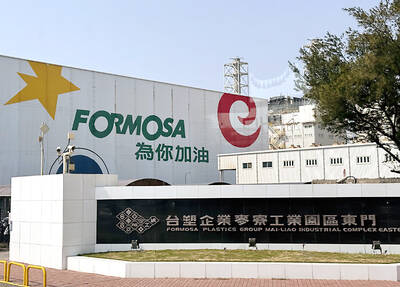Finance officials from countries that comprise more than 80 percent of the world economy headed into round-table talks yesterday aimed at finding common ground amid deep divisions on how to tackle the global downturn.
Finance ministers and central bankers from the G20 countries were divided over whether to use fiscal stimulus — big spending packages and tax cuts — or better regulation to drag the world economy out of its slump.
The US wants countries to make a coordinated commitment to increase spending as a vital part of any rescue effort, but many European countries are balking at loading up on debt, preferring to focus on reform of the international financial architecture.

PHOTO: BLOOMBERG
The IMF estimates that only Saudi Arabia, Australia, China, Spain and the US will introduce budget boosts of 2 percent of GDP this year, the level that US Treasury Secretary Timothy Geithner considers “reasonable.”
Complicating matters, China has raised warnings about what Washington’s drive to spend its way out of recession might do to US government debt, which Beijing holds in large quantities.
Chinese Premier Wen Jiabao (溫家寶) has sent a clear warning: Don’t devalue the dollar — and China’s estimated US$1 trillion in dollar-denominated US government debt — through reckless spending.
US Treasury spokeswoman Heather Wong countered that concern, saying that the US Treasury market “remains the deepest and most liquid market in the world” and that US President Barack Obama was committed to restoring growth and fiscal sustainability.
Officials held one-to-one talks on Friday before yesterday’s full round-table meeting. Geithner met with Japanese Finance Minister Kaoru Yosano, whose government backs the US call for more spending, as well as with Mexican Treasury Secretary Agustin Carstens and European Central Bank Chief Jean-Claude Trichet on Friday. But he had no announced plans for talks with the Chinese delegation.
The debate on spending or regulation amid the wider G20 — which includes emerging powerhouses such as China, India and Brazil along with the world’s wealthiest countries — is threatening to derail progress.
The meeting at a country lodge in Horsham, 50km south of London, is to lay the groundwork for a full summit of G20 heads of state and government on April 2 and there are fears that it will do too little to set a common agenda for that gathering.
“The danger now is doing nothing too little, too late,” World Bank President Robert Zoellick warned after arriving in Britain for the meeting. “Incremental changes will prolong and increase risks.”
Meanwhile, French Finance Minister Christine Lagarde told reporters she was optimistic that the meeting could get results by discussing economic stimulus plans, global financial regulation and rescuing troubled banks.
Zoellick, a former top US State Department official who has forecast the world economy will shrink by 1 percent to 2 percent this year, said that this year “is shaping up to be a very dangerous year” and added that difficulties could extend “well into 2010.”
Zoellick said that he was afraid that fiscal stimulus without reform to clean up the troubled assets weighing down banks balance sheets and recapitalize the banks would lead to a delayed headache after the immediate crisis.
“Turnaround can’t happen unless you clean up the bad assets and recapitalize the banks,” he said. “If you don’t take on the banking issue, the stimulus is just like a sugar high. It pushes some energy through the system, but then you get the let down unless you reopen the credit markets.”
While the UK has begun a program to insure so-called toxic assets from banks, the US has yet to implement a similar plan.
One thing both the US and European officials do agree on is the need to increase funding to the IMF so it can help countries in trouble.
The 16 nations that use the euro agreed this week to urge governments to double the IMF’s resources to US$500 billion and give it a key role overseeing risks to the global economy.

EXTRATERRITORIAL REACH: China extended its legal jurisdiction to ban some dual-use goods of Chinese origin from being sold to the US, even by third countries Beijing has set out to extend its domestic laws across international borders with a ban on selling some goods to the US that applies to companies both inside and outside China. The new export control rules are China’s first attempt to replicate the extraterritorial reach of US and European sanctions by covering Chinese products or goods with Chinese parts in them. In an announcement this week, China declared it is banning the sale of dual-use items to the US military and also the export to the US of materials such as gallium and germanium. Companies and people overseas would be subject to

Taiwan Semiconductor Manufacturing Co (TSMC, 台積電) founder Morris Chang (張忠謀) yesterday said that Intel Corp would find itself in the same predicament as it did four years ago if its board does not come up with a core business strategy. Chang made the remarks in response to reporters’ questions about the ailing US chipmaker, once an archrival of TSMC, during a news conference in Taipei for the launch of the second volume of his autobiography. Intel unexpectedly announced the immediate retirement of former chief executive officer Pat Gelsinger last week, ending his nearly four-year tenure and ending his attempts to revive the

WORLD DOMINATION: TSMC’s lead over second-placed Samsung has grown as the latter faces increased Chinese competition and the end of clients’ product life cycles Taiwan Semiconductor Manufacturing Co (TSMC, 台積電) retained the No. 1 title in the global pure-play wafer foundry business in the third quarter of this year, seeing its market share growing to 64.9 percent to leave South Korea’s Samsung Electronics Co, the No. 2 supplier, further behind, Taipei-based TrendForce Corp (集邦科技) said in a report. TSMC posted US$23.53 billion in sales in the July-September period, up 13.0 percent from a quarter earlier, which boosted its market share to 64.9 percent, up from 62.3 percent in the second quarter, the report issued on Monday last week showed. TSMC benefited from the debut of flagship

TENSE TIMES: Formosa Plastics sees uncertainty surrounding the incoming Trump administration in the US, geopolitical tensions and China’s faltering economy Formosa Plastics Group (台塑集團), Taiwan’s largest industrial conglomerate, yesterday posted overall revenue of NT$118.61 billion (US$3.66 billion) for last month, marking a 7.2 percent rise from October, but a 2.5 percent fall from one year earlier. The group has mixed views about its business outlook for the current quarter and beyond, as uncertainty builds over the US power transition and geopolitical tensions. Formosa Plastics Corp (台灣塑膠), a vertically integrated supplier of plastic resins and petrochemicals, reported a monthly uptick of 15.3 percent in its revenue to NT$18.15 billion, as Typhoon Kong-rey postponed partial shipments slated for October and last month, it said. The